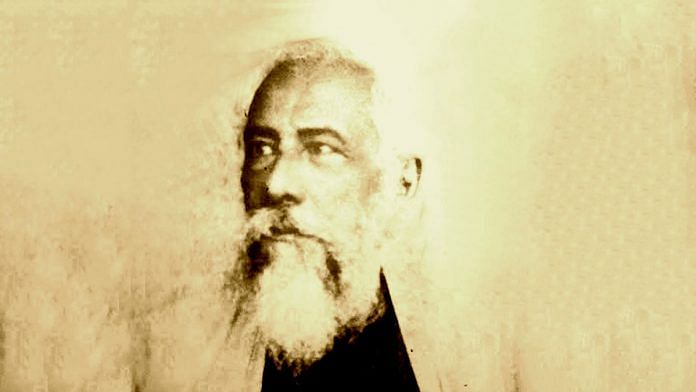Debendranath Tagore founded took the principles championed by Raja Ram Mohan Roy and turned them into Brahmoism, an influential religion in Bengal.
New Delhi: Sandwiched between an icon father, ‘Prince’ Dwarkanath, and an incandescent son, ‘Gurudev’ Rabindranath, the life of Debendranath Tagore is relatively unknown and firmly tucked away in history, forgotten by all but the most ardent admirers of Bengal’s most famous family.
But in his own right, Debendranath was no slouch — he founded a religion, Brahmoism, in 1848 and remained faithful to and consumed by it until his death 114 years ago on 19 January 1905.
Taking inspiration from Raja Ram Mohan Roy’s Brahmo Sabha (later Brahmo Samaj), Brahmoism was a reformist religion that was critical to the Bengal Resistance of the 19th century. It relied heavily upon readings of the Upanishads, of which Debendranath became a master, or ‘Maharishi’, as he was later nicknamed.
On his initial visits to the Brahmo Sabha, Debendranath noticed how people of all castes and creeds were welcomed in without discrimination. He ran a separate theological society called Tatwabodhini Sabha, but later decided to merge the two and take over the Brahmo movement.
“I took upon myself the task of reforming the Brahmo Samaj and amalgamated the Tatwabodhini Sabha with it,” he wrote in his autobiography. “It was arranged that the Tatwabodhini Sabha would further the interests of the Brahmo Samaj.”
The reformist approach, including the renunciation of the caste system and idol worship, made Brahmoism one of the most influential religions of the time, and its ideas have endured. Though the community has shrunk considerably, Brahmos still gather for annual conferences and celebrations.
Also read: Sarat Chandra Chattopadhyay, the creator of some of Indian literature’s most iconic women
A fundamental shift
Debendranath was born into a family of wealth and opulence. Dwarkanath Tagore, his father, was a zamindar who owned several properties and businesses, trading in tea and jute, sugar refining, newspapers and shipping, among other things.
But by the time he was 18, Debendranath developed a sense of detachment while continuing his dealings with worldly affairs and carrying forward his father’s legacy.
By the time Dwarkanath died in debt in 1846, Debendranath had delegated most of these dealings to staff. Instead, he chose to spend his time dwelling upon spiritual truth, which became a lifelong pursuit.
The death of his grandmother, whom he was deeply fond of, was responsible for this fundamental change. Her passing away changed a young and impressionable Debendranath forever.
“I was as if no longer the same man. A strong aversion to wealth arose within me. The coarse bamboo-mat on which I sat seemed to be my fitting seat, carpets and costly spreadings seemed hateful, in my mind was awakened a joy unfelt before,” he wrote.
Also read: Cats that wink & science of comets: Sukumar Ray’s fantastic world of literature and creatures
Beyond Brahmo
As he aged, Debendranath became more reclusive, withdrawing from the bustle of the religion he founded, and seeking a more peaceful environment. In the 1860s, he moved to Santiniketan — which was to become synonymous with his son Rabindranath — where he continued to read scriptures and ponder the limits of Brahmoism.
Over the course of his life, Debendranath had 15 children with his wife, Sarada Devi. Little is known about Sarada, who died in 1875. She is mentioned, along with their children, only once in Debendranath’s autobiography, and that too in passing. His first love was his God, his Brahmo.
“I went and sat underneath an ashvattha tree, and according to the teaching of
the saints began meditating on the Spirit of God dwelling within the soul,” he wrote on his first vision of Brahmo.
“My mind was flooded with emotion, my eyes were filled with tears. All at once, I saw the shining vision of Brahma in the lotus core of my heart. A thrill passed through my whole body, I felt a joy beyond all measure.”



